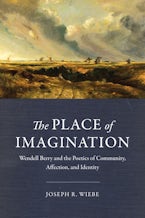This superbly researched book not only depicts the moral landscape of Wendell Berry’s fiction. It also interprets why that world bears such wide cultural significance. In sharp conversation with critics and admirers of Berry, Wiebe explains how the sort of moral imagination cultivated by Berry matters for everyone thinking about community, land, and identity.
~Willis Jenkins, Associate Professor of Religious Studies and Director of Graduate Studies, University of Virginia
Wendell Berry is our finest living writer, and so it is always good to see people working out the meanings of his various writings. His fiction seems particularly powerful right now-- The Place of Imagination is a very timely volume.
~Bill McKibben, editor of American Earth: Nature Writing Since Thoreau
A needed contribution for both the casual and scholarly reader of Wendell Berry.
~D. Dixon Sutherland, Reading Religion
Wiebe masterfully demonstrates the transformative imagination that Berry embodies...
~Kathryn Bradford Heidelberger, The Christian Century
If the cultivation of 'place-based identity' and 'locally adapted communities' is the heartbeat of Berry's work, Joseph Wiebe in The Place of Imagination: Wendell Berry and the Poetics of Community, Affection, and Identity establishes the irreducible role of the imagination as the sine qua non of such moral formation and explores the fictional characters of Berry's own imagine place of Port William, Kentucky as essential companions in this formation.
~Elizabeth R. Powell, Anglican Theological Review
Wiebe provides readers with a way to faithfully and honestly engage Berry’s Port William stories.
~Josh Skinner, Christianity and Literature
This book is essential for doing work in theology with Wendell Berry. It should be of interest to anyone wanting to cultivate a more affectionate imagination amidst an alienating economy.
~Gerald Ens, Conrad Grebel Review
As a whole, Wiebe’s work is an impassioned monograph that shows the import of fiction--and Berry’s fiction in particular--for helping readers learn to imagine transformed communities that seek to redress historical and current human traumas as well as environmental injury in our places.
~The Year's Work in English Studies
…a brilliantly refreshing text that moves more responsively and generatively with Wendell Berry's writing than any others I have read. Reflectively engaging in the difficult imaginative processes of Berry’s fictional characters and Berry himself, Wiebe incisively illuminates how we might endeavor to lean our lives into affectionate perception and responsive interaction that gradually transform violent legacies toward beloved communities.
~Romand Coles, Direction
… The Place of Imagination is especially appropriate for those of us who teach Berry’s fiction to undergraduates and have been looking for ways to draw out the real-world implications for young people who have been shaped by narratives of flight and upward mobility.
~Jack R. Baker, Journal for the Study of Religion, Nature and Culture
The book beckons readers to hold Berry and his stories as a mirror--to engage in introspection and self-interrogation--that we might learn something about sympathy and affection needed for engaging our places non-imperialistically.
~Jacob Alan Cook, Journal of the Society of Christian Ethics
Overall, Wiebe's book succeeds in offering students and admirers of Berry's writing a nuanced and comprehensive analysis. This largely sympathetic reading of Berry will undoubtedly be an important contribution in and of itself. This study of the community-forming power of imagination will also be of interest to those working in the areas of ecological theology, environmental ethics, and theopoetics.
~Nathanael L. Inglis, Mennonite Quarterly Review

